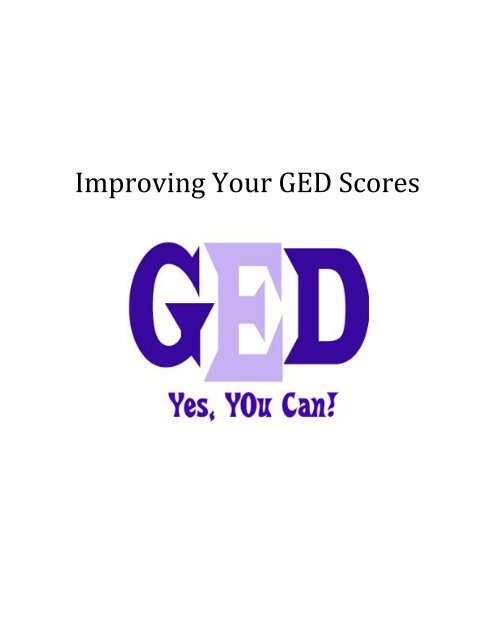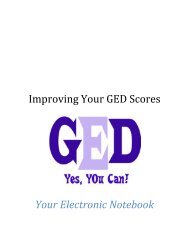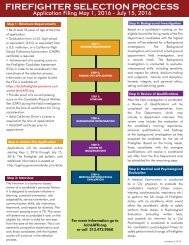Project.docx
Create successful ePaper yourself
Turn your PDF publications into a flip-book with our unique Google optimized e-Paper software.
Improving Your GED Scores
[I should say something here‐ basically summarize what is below. Also, can I use these<br />
words directly from the websites?]<br />
Yes you can!<br />
Have you ever thought about what you need to succeed at taking tests?<br />
It should come as no surprise that to do well on any test, your preparation should include<br />
learning what the test covers and studying areas you don't know.<br />
What is covered on the writing portion of THE GED® RLA TEST<br />
The writing component integrates reading and writing into meaningful tasks that require<br />
candidates to support their written analysis with evidence drawn from a given source text(s) of<br />
appropriate complexity provided in the test. Also, given the growing demand and use of<br />
technology in all levels of postsecondary education and careers, the GED® test is administered<br />
by computer. Therefore, as in the reading component of the RLA Test, the following two<br />
highlevel standards, which correspond with Career and College Ready Standards 9 and 6<br />
respectively, broadly govern all aspects of the writing tasks.<br />
1 Draw relevant and sufficient evidence from a literary or information text to support<br />
analysis and reflection.<br />
2 Use technology to produce writing, demonstrating sufficient command of keyboarding<br />
skills.<br />
Candidate responses are scored by a computer using a multitrait rubric that focuses on three<br />
elements:<br />
• Trait 1: Analysis of Arguments and Use of Evidence<br />
• Trait 2: Development of Ideas and Structure<br />
• Trait 3: Clarity and Command of Standard English<br />
Source GED website http://www.gedtestingservice.com/testers/rlalink<br />
Language Conventions and Usage on the GED ® RLA TEST<br />
The language component of the GED ® RLA Test measures a candidate’s ability to demonstrate<br />
command of a foundational set of conventions of standard English that have been identified as<br />
most important for career and college readiness by higher education instructors of<br />
postsecondary entrylevel, creditbearing composition courses. This core set of skills includes<br />
essential components of grammar, usage, capitalization and punctuation.<br />
The GED ® RLA Test includes editing items in an authentic context in which highlighted words<br />
or phrases appear in dropdown menus offering alternatives, which include a clear best choice<br />
alongside common errors or misconceptions.<br />
Source GED website http://www.gedtestingservice.com/testers/rlalink
Reasoning Through Language Arts (RLA) is one of the four GED subjects for which there is<br />
a free online or downloadable practice testavailable through the GED Testing Service.<br />
Each free practice test is onequarter of a fulllength test. A detailed score regarding your<br />
readiness to pass the GED does not accompany this test.<br />
GED Ready<br />
While the free RLA practice test above is worth taking, it is not called one of the “official”<br />
practice tests of the GED Testing Service.<br />
The official practice tests are known as GED Readyand cover all subjects of the GED.<br />
The GED Ready practice tests are computerized and cost $6.00 per subject. Each test is onehalf<br />
of a fulllength test.<br />
To gain access to the GED Ready practice tests, a student can:<br />
• Log in to the Study section of MyGEDand click “Take GED Ready” to purchase OR<br />
• Visit GED MarketplaceOR<br />
• Visit an adult education center, which can be located via MyGED.<br />
You should sign up with MyGED and take all of the GED Ready practice tests. It will be well<br />
worth the effort. Each GED Ready practice test gives you a detailed score regarding your<br />
readiness to pass the GED.<br />
Source: https://howtopasstheged.com/2014/02/11/rla‐practice‐test‐ged‐testing‐service/<br />
[I should say something here: Work through these modules at your own pace and on your<br />
own time. If you are a student at a college that uses eTutoring, click the link at the end of<br />
each module to log in with your information and get help from a real person.]<br />
Unit 1 (Traits 2 & 3): Run‐ons and comma splices<br />
1. Here is a video to explain briefly what run‐ons and comma splices are.<br />
https://www.youtube.com/watch?v=mQfJdhyeQfU<br />
2. Check out this site for a great explanation of run‐ons and how to fix them.<br />
http://www.myenglishteacher.net/runonsentences.htmlThere is a quiz at the end<br />
of the lesson to test if you’ve got it!<br />
3. Now is a good time to reflect on whether or not you have learned what you set out<br />
to learn in this module. How did you do on the quiz? Taking a moment to reflect on<br />
what you have learned: https://www.youtube.com/watch?v=XIsznZR4hzY<br />
4. If you need a different explanation, look at this short lesson that explains this in<br />
another way. https://www.youtube.com/watch?v=h0diPEXXf5Q<br />
5. And if you want more practice activities, look here.<br />
http://grammar.ccc.commnet.edu/grammar/quizzes/runons_quiz.htm<br />
6. Get help from a real person if you are a student at an institution that supports<br />
eTutoring. https://www.etutoring.org/login.cfm?institutionid=295&returnPage=
Unit 2 (Traits 2 & 3): Fragments<br />
1. Here is a video to briefly explain what a fragment is.<br />
https://www.youtube.com/watch?v=r‐Wcr4Wgf7U<br />
2. Check out this site for a great explanation of fragments and how to fix them.<br />
http://www.myenglishteacher.net/sentencefragments.htmlThere is an exercise at<br />
the end of the lesson to test if you’ve got it!<br />
3. If you need a different explanation, look at this short lesson that explains this in<br />
another way. https://www.youtube.com/watch?v=JAuCJIzrwn4<br />
4. And if you want more practice activities, look here.<br />
https://owl.english.purdue.edu/exercises/5/18/38/<br />
http://grammar.ccc.commnet.edu/grammar/quizzes/fragment_fixing.htm<br />
http://grammar.ccc.commnet.edu/grammar/cgi‐shl/quiz.pl/fragments_add1.htm<br />
5. Get help from a real person if you are a student at an institution that supports<br />
eTutoring. https://www.etutoring.org/login.cfm?institutionid=295&returnPage=<br />
Unit 3 (Traits 2 & 3): Construction shift [I should say something here]<br />
1. Many of the questions on the GED RLA exam deal with grammar by asking you to<br />
change the structure of a sentence while keeping the meaning the same. This takes some<br />
practice for most people. You have to remember to rewrite the whole sentence in your<br />
head before choosing the best answer. Click on the link below to try some of these<br />
“construction shift” type questions. You get an immediate response to your answer choice<br />
with explanations and links to more practice!<br />
http://ux.brookdalecc.edu/fac/writing/095/practice/ConstructShiftQues.html<br />
2. Practicing construction shift will help you to be able to summarize, paraphrase, and<br />
write support from the articles you read in your own words. Here is a free six‐lesson<br />
e‐course to help you learn to paraphrase effectively:<br />
http://www.eslwriting.org/learn‐paraphrase‐writing/<br />
3. Get help from a real person if you are a student at an institution that supports eTutoring.<br />
https://www.etutoring.org/login.cfm?institutionid=295&returnPage=<br />
Unit 4 (Traits 1, 2, & 3): Extended Response Format and Structure [Now you are ready to<br />
start writing! I should say something here‐ the info that is in #s 2 & 3 below]
1. Here are two videos that explain the basics of the RLA Extended Response:<br />
https://www.youtube.com/watch?v=HBcVJ‐2PhUQ<br />
https://www.youtube.com/watch?v=SvUE0POFp2o<br />
2. On the RLA test, you will have 45 minutes to complete the reading, analysis, and<br />
writing for the extended response item. The scoring engine (you are being scored by<br />
a computer) knows this is first‐draft writing, so although it expects you to know<br />
how to write, it does not expect perfection. Also, there is NO right or wrong answer.<br />
You can choose either the pro or con position as long as you support it with<br />
evidence from the text.<br />
3. Remember this: Even though what you read will be different in each version of the<br />
test, the wording of the prompt and the task outlined in the prompt will<br />
remain the same. Here is the RLA PROMPT:In your response, analyze both<br />
positions presented to determine which one is best supported. Use relevant and<br />
specific evidence from the article to support your response.<br />
4. This website offers extensive practice on the extended responses from both the RLA<br />
and Social Studies portions of the GED exam. You will find sample texts, prompts,<br />
and answers, as well as thorough explanations of the steps you need to take to write<br />
outstanding responses: https://howtopasstheged.com/extended‐response/<br />
5. Get help from a real person if you are a student at an institution that supports<br />
eTutoring. https://www.etutoring.org/login.cfm?institutionid=295&returnPage=<br />
Unit 5: Keyboarding Skills<br />
[I should say something here]<br />
1. This website offers free typing lessons, practice, and games. You do not even<br />
have to register. Your progress is saved on your computer as a cookie. Lessons<br />
should be taken in sequence because they build on each other.<br />
http://powertyping.com/<br />
2. Here is another great website to learn typing for free.<br />
https://www.typingclub.com/





